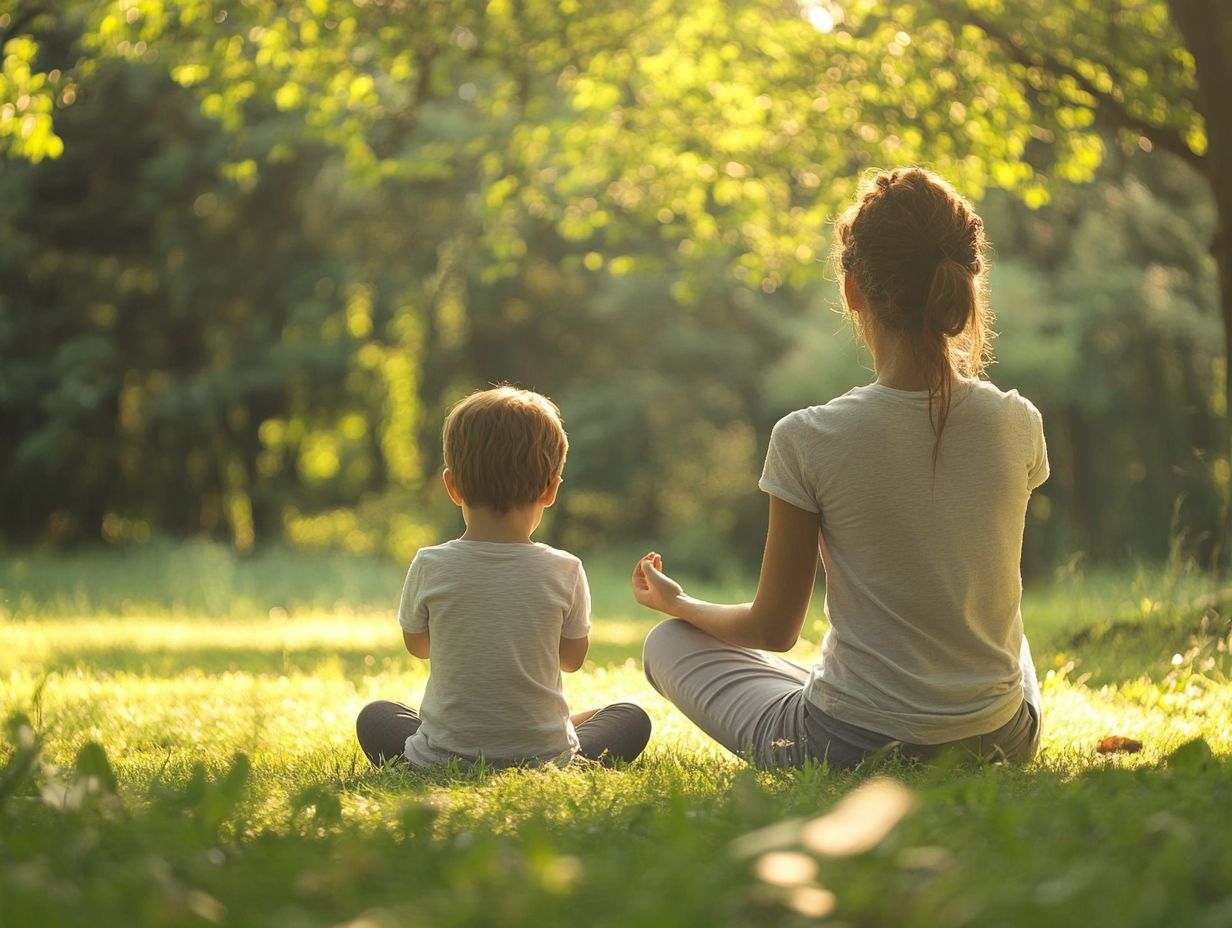What are the Long-Term Benefits of Mindful Parenting?
In today’s fast-paced world, you may often find parenting to be a whirlwind of challenges. Let s dive into the exciting world of mindful parenting, a refreshing approach that nurtures deeper connections with your children. Techniques inspired by behavioral science and developmental research can further enhance these connections.
Mindful parenting offers long-term benefits. It strengthens parent-child bonds and improves coping skills. Witness how this approach, supported by empirical research, can transform your relationship with your child and enhance their overall well-being.
Contents
- Key Takeaways:
- What Is Mindful Parenting?
- What Are The Principles Of Mindful Parenting?
- Being Present In The Moment
- Acceptance And Empathy
- Self-Regulation
- How Can Mindful Parenting Benefit Children?
- What Are The Long-Term Benefits Of Mindful Parenting and Adult-Child Interactions?
- Frequently Asked Questions
- What are the long-term benefits of mindful parenting?
- How does mindful parenting improve emotional regulation?
- Can mindful parenting help strengthen the parent-child relationship?
- How can mindful parenting benefit a child’s development in the long run?
- What are some other long-term benefits of mindful parenting?
- Is it ever too late to start practicing mindful parenting?
Key Takeaways:

- Mindful parenting promotes better mental health for parents and children, addressing issues like anxiety and ADHD.
- It boosts the bond between parent and child through empathy and positive parenting practices.
- Mindful parenting can lead to long-term benefits for children, such as improved self-regulation and coping skills.
What Is Mindful Parenting?
Mindful parenting is all about taking an intentional and conscious approach to raising your children. It encourages you to focus on the present moment, fostering a deeper connection between you and your little ones. Insights from renowned experts like Bren Brown and organizations such as the Daring Leadership Institute can guide you on this journey.
This method is grounded in mindfulness practices. It allows you to actively engage with your children’s needs while cultivating emotional regulation, empathy, and positive parenting techniques.
By weaving mindfulness into your parenting routine, you create a nurturing environment that supports your children’s emotional and psychological well-being and promotes your own personal growth, positive behavior changes, and holistic wellness.
What Are The Principles Of Mindful Parenting?
The principles of mindful parenting center on essential concepts like being aware without judging, acceptance, empathy, and the ability to manage your feelings, all of which are vital for cultivating robust parent-child relationships.
By embracing these principles, you can nurture your emotional awareness, elevate your communication skills, and foster a stronger parent-child relationship. This ultimately results in improved emotional regulation for both you and your children.
1. Non-judgmental Awareness
Non-judgmental awareness in mindful parenting invites you to observe your thoughts and feelings without criticism. This allows you to respond thoughtfully rather than react impulsively. This practice is supported by behavioral science and can lead to significant behavior change over time.
This practice creates a nurturing environment where you can manage your emotional responses, modeling calmness and resilience for your children. For instance, when your child expresses frustration over a missed goal, approaching the situation with curiosity instead of judgment can make all the difference. You might ask open-ended questions about what they re experiencing, which validates their feelings and fosters their emotional intelligence and stress management skills.
During those inevitable moments of sibling rivalry, taking a step back to observe the dynamics without assigning blame can facilitate discussions that encourage understanding and cooperation. By incorporating these mindful interactions into your daily life, you set the stage for healthier emotional regulation and stress management for both you and your children.
Embrace these practices now to cultivate emotional regulation, and apply mindful parenting techniques in your daily life for immediate benefits.
Being Present In The Moment
In today’s fast-paced world, being present with your child is more crucial than ever. Being present in the moment means fully engaging with your child during interactions. This fosters deeper emotional connections and enhances communication skills. Techniques from executive coaching can be adapted to strengthen these interactions.
When you practice mindfulness, you create a nurturing environment where your child feels valued and understood. Techniques such as active listening, maintaining eye contact, and minimizing distractions can significantly strengthen the parent-child relationship, similar to curated growth journeys.
For instance, when you set aside dedicated time for activities whether it s playing a game or simply chatting about their day you open the door to meaningful exchanges. These exchanges cultivate trust and security. By being fully engaged, you help your child develop a sense of self-worth, as they come to realize that their thoughts and feelings truly matter.
By prioritizing presence in your parenting, you significantly enhance your child s overall emotional well-being. This paves the way for their healthy development.
Acceptance And Empathy
Acceptance and empathy in mindful parenting mean acknowledging your child’s feelings and experiences. This creates a nurturing environment that fosters emotional growth. This foundational approach enables you to validate your child’s emotions, cultivating resilience and a deep emotional connection.
Experts like Matthew Sanders and Trevor Mazzucchelli emphasize the importance of compassion in parenting. When you demonstrate empathy, you re not just passively listening. You actively help your child navigate their emotions with understanding and compassion.
For example, during tough times like tantrums or disappointments, you can practice empathy by labeling their emotions. Reflect back what you observe, and offer comfort without judgment. These techniques are widely used in coaching support and can be very effective.
This approach helps your child feel truly understood. It also teaches them essential skills in emotional regulation and validation, equipping them to process their feelings more effectively in the future.
Self-Regulation

Self-regulation, which means managing your emotions, is a crucial skill. This serves as a powerful model for your children in learning how to handle their feelings. This ability is often bolstered by stress management and self-care practices recommended by experts in the field.
By practicing self-regulation, you elevate your own emotional awareness. This creates a solid foundation for your children s behavioral changes. When you remain calm in challenging situations, you teach your children how to navigate their emotions and reactions with greater effectiveness.
This approach is supported by developmental research and insights from psychology. To nurture this essential skill, consider weaving mindfulness practices into your daily routine.
Setting aside moments for deep breathing or reflection during stressful times can make a significant difference. Establishing a routine that emphasizes self-care ensuring you get enough rest and engage in activities that bring you joy can greatly enhance your emotional well-being. This ultimately fosters a more harmonious family environment.
How Can Mindful Parenting Benefit Children?
Mindful parenting offers incredible benefits that can transform your child’s life! This approach presents a wealth of advantages for children, such as improved emotional regulation, heightened empathy, enhanced social skills, and sharpened focus. These are key ingredients for healthy development.
By cultivating an environment that prioritizes your child’s needs, you not only nurture resilience but also equip them with essential tools for personal growth and flourishing relationships.
1. Improved Emotional Regulation
Improved emotional regulation in children stems from your mindful parenting techniques that foster self-awareness and equip them with effective coping strategies.
When you engage in mindful practices, you cultivate a nurturing environment that enhances emotional intelligence. Techniques like active listening enable your children to express their feelings freely.
Your reflective responses validate their emotions, ensuring they feel truly seen and heard. Teaching your children to identify and label their feelings can significantly broaden their emotional vocabulary, which is essential for self-regulation.
You can introduce simple breathing exercises or visualization techniques during moments of distress, guiding them in learning how to calm themselves effectively. These methods are often used in mindfulness practices and personal growth guidance.
By modeling patience and empathy, you empower your children to respond to challenging situations with resilience and understanding. This is incredibly beneficial for children dealing with stress, anxiety, or ADHD!
2. Increased Empathy And Compassion
Increased empathy and compassion in children arise from the modeling of these traits by mindful parents who actively listen and validate their feelings. Utilizing techniques from personality assessments can further aid in understanding and developing these traits.
By engaging in intentional conversations and showing genuine interest in your child s experiences, you create an environment where feelings are honored and appreciated. Simple strategies, like reflecting back what your child expresses, asking open-ended questions, and sharing your own feelings in a relatable way, can effectively cultivate understanding.
The principles of Bren Brown’s Daring Leadership can be quite useful in these interactions. Moreover, involving your children in community service or acts of kindness reinforces these values in their everyday lives.
By incorporating these practices into your family routines, you instill empathy and compassion while nurturing strong, connected relationships that inspire your children to embrace and emulate these important traits. Programs like those offered by BetterUp can provide additional support in cultivating these values in your children!
3. Better Social Skills
Mindful parenting significantly enhances your child’s social skills by promoting healthy communication patterns and nurturing positive interactions between you and your little one. Resources like Verywell Mind can provide valuable insights into these processes.
When you practice mindfulness, you naturally model effective communication, demonstrating to your child how to express thoughts and feelings in a clear and respectful manner. These interactions not only enable your child to articulate their needs but also nurture empathy a critical component for grasping the perspectives of their peers.
As they observe you engaging in active listening and responding with compassion, they learn to manage their emotions effectively and build the confidence required for social engagement. This contributes to their overall emotional well-being and holistic wellness!
As a result, this supportive environment fosters strong social connections, equipping your child with the essential skills to build lasting friendships throughout their lives.
4. Enhanced Focus And Concentration in Child Development
Enhanced focus and concentration in children can be cultivated through mindfulness practices that guide them to remain present and fully engaged in their activities.
By weaving simple techniques into their daily routines, you provide young minds with the essential tools to enhance their attention span. For instance, introducing mindful breathing exercises can ground children, helping them anchor their thoughts and minimize distractions.
Another powerful practice is mindful observation, where they take a few moments to closely examine their surroundings, fostering awareness and sharpening cognitive skills. Incorporating storytelling sessions that center around emotions can further encourage kids to process their feelings while honing their focus!
These strategies nurture concentration and aid in emotional regulation and holistic development, laying a solid foundation for more enriching learning experiences.
Incorporate these mindful parenting techniques into your daily life to experience immediate benefits for both you and your child!
What Are The Long-Term Benefits Of Mindful Parenting and Adult-Child Interactions?

Imagine a world where your child feels secure, understood, and ready to face any challenge. Mindful parenting can make this a reality. The long-term advantages of mindful parenting reach far beyond the immediate emotional rewards you might experience. It can lead to enhanced mental health, deeper connections with your children, and more constructive parenting approaches that cultivate resilient adults. Leaders in mindfulness like Bren Brown and organizations such as BetterUp emphasize its importance.
By embracing mindful practices, you create an environment where your children feel secure and supported, which significantly promotes their overall well-being and equips them to tackle life’s challenges with confidence.
1. Improved Mental Health and Personal Effectiveness
Improved mental health in both you and your children often springs from the stress management techniques that come with mindful parenting. Matthew Sanders and Trevor Mazzucchelli prove these techniques work.
By embracing practices like deep breathing exercises, regular family check-ins, and active listening, you can create a supportive environment that nurtures emotional well-being.
For instance, when you take a few moments each day to engage in mindfulness meditation, you enhance your awareness and patience. This can lead to more empathetic responses to your child s needs. This approach has been highlighted by Verywell Mind as essential for child development.
Incorporating quiet time and active play into your family routines allows your children to express their emotions freely, fostering resilience and reducing anxiety. These mindful moments can create a ripple effect, helping your entire family navigate life’s challenges with greater ease and understanding. This is particularly beneficial for children with Attention Deficit Hyperactivity Disorder (ADHD), as it helps them to channel their energy positively.
2. Stronger Parent-Child Bond
A stronger bond between you and your child flourishes through the consistent practice of mindfulness, enhancing both emotional regulation and communication skills.
When you engage in mindfulness practices, such as deep breathing or guided meditation, you create a calm and focused environment for your child. This approach not only reduces stress but also paves the way for more meaningful conversations.
Try sharing a simple activity like mindful walking, where you and your child observe your surroundings together, discussing the sights, sounds, and feelings you encounter. This shared experience cultivates a rich dialogue that nurtures trust and understanding.
Practicing gratitude exercises, where both of you express what you re thankful for, can deepen your emotional connection. This encourages reflection on your experiences and fosters a greater appreciation for one another.
3. More Positive Parenting Practices
Mindful parenting opens the door to more positive parenting practices, as you become increasingly aware of your responses and behaviors towards your children. This heightened awareness allows you to identify patterns in your interactions, giving you the opportunity to adjust your reactions in a way that best serves your family.
As you create patience and empathy, you find yourself responding thoughtfully rather than reacting impulsively. This mindful approach creates a nurturing environment that reinforces positive behaviors in your children, encouraging them to develop emotional intelligence and resilience.
By embracing mindful parenting, you equip yourself with effective strategies for tackling challenges, leading to a more harmonious family dynamic that promotes healthy development and strengthens the bond between you and your child. Exploring the benefits of mindful parenting can further enhance your approach.
4. Better Self-Regulation, Coping Skills, and Agility and Resilience for Children
Better self-regulation and coping skills in children can be nurtured through mindful practices that enhance their emotional awareness and resilience. These practices help children become more agile and resilient, which is important for dealing with life’s challenges.
Weave mindfulness into your daily routines to boost your child’s ability to manage their emotions. Simple strategies, like practicing deep breathing exercises together during stressful moments or encouraging open discussions about feelings, can foster a supportive environment.
Creating family rituals can be a fun and effective way to promote emotional literacy. Establishing a family ritual for checking in on emotions perhaps around the dinner table not only helps your child understand their feelings but also equips them with the tools to respond to situations in a calm and thoughtful manner, ultimately leading to more balanced reactions as they grow.
For additional resources, check out the Daring Leadership Institute or explore coaching opportunities through BetterUp.
Frequently Asked Questions
What are the long-term benefits of mindful parenting?

Mindful parenting has numerous long-term benefits including improved emotional regulation, stronger parent-child relationships, and increased resilience in children.
How does mindful parenting improve emotional regulation?
Practicing mindfulness helps parents manage their emotions and respond to their child’s emotions with empathy and understanding, which can help children learn to regulate their own emotions.
Can mindful parenting help strengthen the parent-child relationship?
Yes, by being present and attentive to their child’s needs, mindful parents are able to build a stronger and more secure attachment with their child, leading to a stronger relationship over time.
How can mindful parenting benefit a child’s development in the long run?
Mindful parenting can help children develop resilience, self-awareness, and self-management skills that can benefit them throughout their lives. These skills are critical for a thriving workforce and can be assessed through tools like the Big 5 Personality Test.
What are some other long-term benefits of mindful parenting?
Mindful parenting can also lead to improved communication, better decision-making skills, and a more peaceful and harmonious household.
Is it ever too late to start practicing mindful parenting?
It’s never too late to start incorporating mindful parenting into your parenting style. While it may be easier to start when children are young, the benefits can still be seen even if children are older. This practice is valuable regardless of where you are, whether in New York or elsewhere.
Start practicing mindful parenting today to unlock its powerful benefits for you and your child!






